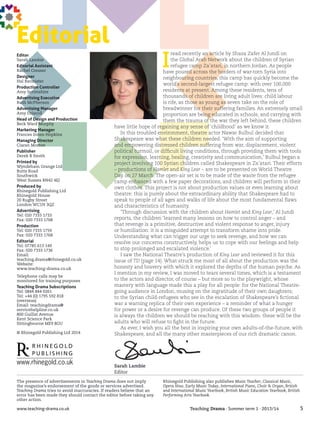More Related Content
Similar to Editorial TD Summer 1
Similar to Editorial TD Summer 1 (12)
Editorial TD Summer 1
- 1. 5Teaching Drama · Summer term 1 · 2013/14www.teaching-drama.co.uk
Editorial
I
read recently an article by Shaza Zafer Al Jundi on
the Global Arab Network about the children of Syrian
refugee camp Za’atari, in northern Jordan. As people
have poured across the borders of war-torn Syria into
neighbouring countries, this camp has quickly become the
world’s second-largest refugee camp: with over 100,000
residents at present. Among these residents, tens of
thousands of children are living adult lives: child labour
is rife, as those as young as seven take on the role of
breadwinner for their suffering families. An extremely small
proportion are being educated in schools; and carrying with
them the trauma of the war they left behind, these children
have little hope of regaining any sense of ‘childhood’ as we know it.
In this troubled environment, theatre actor Nawar Bulbul decided that
Shakespeare was what these children needed. ‘With the aim of supporting
and empowering distressed children suffering from war, displacement, violent
political turmoil, or difficult living conditions, through providing them with tools
for expression, learning, healing, creativity and communication,’ Bulbul began a
project involving 100 Syrian children called Shakespeare in Za’atari. Their efforts
– productions of Hamlet and King Lear – are to be presented on World Theatre
Day on 27 March. The open-air set is to be made of the waste from the refugee
camp enhanced with a few paper decorations, and children will perform in their
own clothes. This project is not about production values or even learning about
theatre: this is purely about the extraordinary ability that Shakespeare had to
speak to people of all ages and walks of life about the most fundamental flaws
and characteristics of humanity.
‘Through discussion with the children about Hamlet and King Lear,’ Al Jundi
reports, the children ‘learned many lessons on how to control anger – and
that revenge is a primitive, destructive and violent response to anger, injury
or humiliation: it is a misguided attempt to transform shame into pride.
Understanding what can trigger our urge to seek revenge, and how we can
resolve our concerns constructively, helps us to cope with our feelings and help
to stop prolonged and escalated violence.’
I saw the National Theatre’s production of King Lear and reviewed it for this
issue of TD (page 14). What struck me most of all about the production was the
honesty and bravery with which it explored the depths of the human psyche. As
I mention in my review, I was moved to tears several times, which is a testament
to the actors and director, of course – but more so to the playwright, whose
mastery with language made this a play for all people: for the National Theatre-
going audience in London, musing on the ingratitude of their own daughters;
to the Syrian child-refugees who see in the escalation of Shakespeare’s fictional
war a warning replica of their own experience – a reminder of what a hunger
for power or a desire for revenge can produce. Of these two groups of people it
is always the children we should be reaching with this wisdom: these will be the
adults who will refuse to fight in the future.
As ever, I wish you all the best in inspiring your own adults-of-the-future, with
Shakespeare, and all the many other masterpieces of our rich dramatic canon.
Sarah Lambie
Editor
Editor
Sarah Lambie
Editorial Assistant
Rachel Creaser
Designer
Hal Bannister
Production Controller
Amy Scrimshire
Advertising Executive
Ruth McPherson
Advertising Manager
Amy Driscoll
Head of Design and Production
Beck Ward Murphy
Marketing Manager
Frances Innes-Hopkins
Managing Director
Ciaran Morton
Publisher
Derek B Smith
Printed by
Wyndeham Grange Ltd
Butts Road
Southwick
West Sussex BN42 4EJ
Produced by
Rhinegold Publishing Ltd
Rhinegold House
20 Rugby Street
London WC1N 3QZ
Advertising
Tel: 020 7333 1733
Fax: 020 7333 1768
Production
Tel: 020 7333 1759
Fax: 020 7333 1768
Editorial
Tel: 07785 613 149
Fax: 020 7333 1736
Email:
teaching.drama@rhinegold.co.uk
Website:
www.teaching-drama.co.uk
Telephone calls may be
monitored for training purposes
Teaching Drama Subscriptions
Tel: 0844 844 0261
Tel: +44 (0) 1795 592 818
(overseas)
Email: teachingdrama@
servicehelpline.co.uk
800 Guillat Avenue
Kent Science Park
Sittingbourne ME9 8GU
© Rhinegold Publishing Ltd 2014
Rhinegold Publishing also publishes Music Teacher, Classical Music,
Opera Now, Early Music Today, International Piano, Choir & Organ, British
and International Music Yearbook, British Music Education Yearbook, British
Performing Arts Yearbook.
The presence of advertisements in Teaching Drama does not imply
the magazine’s endorsement of the goods or services advertised.
Teaching Drama tries to avoid inaccuracies. If readers believe that an
error has been made they should contact the editor before taking any
other action.
TD5_SU1_05_editorial.indd 5 24/03/2014 18:20:09
